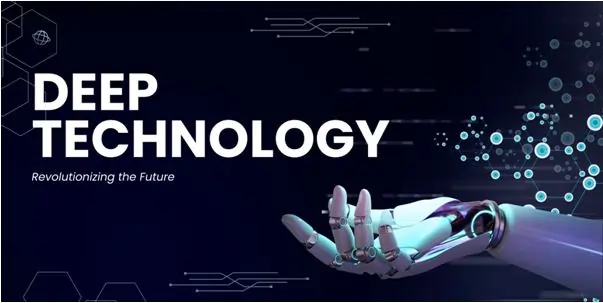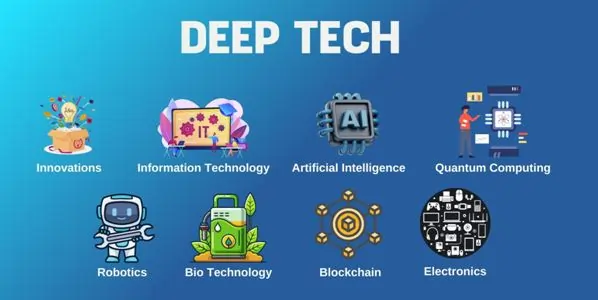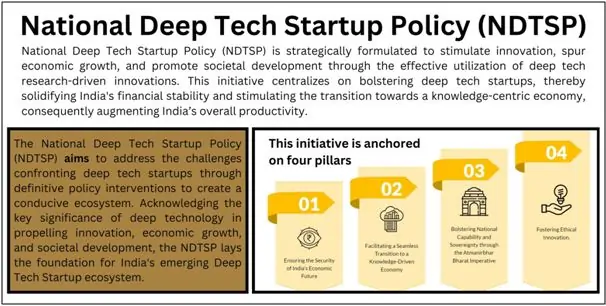Deep technology or deep tech is a new generation of technology that is changing the technological scenario. Deep tech can be distinguished from linear improvement technologies as they posit on proper scientific and engineering breakthroughs. Some fundamental questions are answered in this article, including what constitutes deep tech and how it operates, and the benefits and risks associated with the concept are also discussed.

What is Deep Technology?
Deep technology can be defined as innovations that result from new scientific discoveries or new engineering solutions. These technologies are not simply a continuation of existing applied technologies but are innovative in the approach of elaborating on complex problems that affect society. Areas of emerging technologies, which are considered deep tech include artificial intelligence, biotechnology, quantum computing, advanced material science, and robotics.
Deep tech ventures have certain attributes among them being long periods, sizable capital intensity, and significant technical uncertainties. However, the market risk is less apparent because the overall value of these innovations is easy to identify. Deep tech is currently aimed at building new markets or disrupting current ones through the provision of revolutionary solutions to global problems.
Advantages of Deep Technology
- Solving Complex Problems: Deep tech is applied to solving some of the world’s greatest problems including the environment, health, and energy. For instance, using biotechnology, the knowledge implemented in fixing disease can advance, under quantum technology, data procedure and security can drastically be improved.
- Creating New Markets: In contrast, deep tech takes a different path and may well open new categories of business as it consists of absolutely new solutions. This can help a country to record a considerable economic development and create employment opportunities. For instance, carbon fibre technology can produce new applications in aerospace and aerospace applications or in the electronics field.
- High Impact: Innovations associated with deep tech dictate a very significant influence on the background. AI and robotics are capable of enhancing the various sectors’ performances, and hence quality life and economy.
- Intellectual Property: Venture capital-backed firms with deep technology tend to produce the important source of intangible assets for a competitive advantage and revenue.

Drawbacks of Deep Technology
- High Costs and Long Development Cycles: Firstly, it is notable that growing deep tech solutions entail huge amounts of investment on the R & D. This can be a big issue because it might take years before an idea culminates in a fully-fledged product: Long development cycles may be a big issue for the start-ups since most of it does not have deep pockets in the process.
- Technical Risks: Owing to the fact that deep tech is relatively novel, there is a high level of technical risk involved. This is because many projects can never get to commercialization level due to emergence of some technical hitches.
- Regulatory Hurdles: Many deep tech technologies are subject to significant regulation because the subjects addressed by these technologies, such as biotechnology and healthcare, require regulation. These regulations mean that such arrangements can take time as well as financial resources to manage.
- Market Adoption: Often it is difficult to persuade people in the market to buy new technologies. Due to the changes in infrastructure and user behaviour, deep tech solutions suffer slow adoption rates.
Improving Deep Technology
- Increased Funding and Support: The governments and private investors have to allocate and invest more for deep tech start-ups. Some of these are grants, subsidies and tax credits to ensure the cost to the start-ups is relatively low.
- Collaborative Ecosystems: While promotion of cross-disciplinary collaboration between academia, industry, and government has the potential to speed up the process of advancing and commercializing laureates in the deep tech domain. Such ecosystems can make available for use resources, knowledge and networks that are important for success.
- Streamlined Regulations: When regulatory measures and procedures can be made less complex and more efficient, deep tech businesses can get their products to the marketplace faster. This can also involve some kind of regulation such as formation of specific regulatory policies for new technologies.
- Public Awareness and Education: The growth of knowledge in the public domain can enable the creation of demand for deep tech. Awareness-raising campaigns, educational programmes and public participation can help to explain those technologies and promote the use of their advantages.
- Focus on Ethical Considerations: Preventing different ethical aspects and considering that deep tech development is to be done ethically is non-negotiable. This encompasses including the effects these technologies have on the society and putting measures in place to minimize them.
Conclusion
Deep technology is thus one of the most promising technologies that have the power to change our world with a coming focus on solving some of the existing problems. For all the challenges that the various disadvantages present to the reform process, the benefits mean that the problems are worth overcoming. Creating a supportive environment, raising more investment and making the regulatory processes less complex is the path to realizing the potential of deep tech and outlining the path for the future.
Deep Tech and India: Pioneering the Future
Deep technology or deep tech can be described as a non-surface technology, built on fundamental scientific and engineering breakthroughs. Confucius taxonomy also distinguishes deep tech from more conventional incremental changes to technologies by focusing instead on core challenges. Deep tech is gradually emerging as a growth area in India due to the counties rich start-ups culture and efficient government policies as well trained talent is available easily. Here we will see the present and potential views on deep tech in India, the opportunity it presents as well as the difficulties that lie therein and the prognosis of that situation.
Deep Tech – The Ways of Its Evolution
It can be stated that India possesses a very mature deep tech ecosystem which has rather rich development over the past decade. The country now boasts of having over 3,000 deep technologies start-ups thereby creating a reputation of being at the frontline of innovation. It is noteworthy that many of these start-ups are adopting the best and latest technologies such as AI, quantum computing, biotech, advanced materials and many others to solve some of the biggest challenges in health care, agriculture, energy, and many other fields.
The Indian government has mustered great effort in sustaining this growth. Several programmes such as the National Deep Tech Start-ups Policy (NDTSP) seek to foster the development of deep tech business through capital support, physical resources and favourable policies. Also, the program like nasscom’s Inno Trek introduced the Indian start-ups to the world’s leading tech companies and investors, thus promoting their expansion.

Benefits derived by India from Deep Tech
- Addressing Societal Challenges: The India start-ups venture into deep tech space to help solve the country’s persistent challenges. For example, in the field of medicine, introducing AI technologies resulted in increased diagnostic capabilities as well as patient treatment efficacy; in the field of agriculture, new technologies also brought more crop yield and its quality.
- Economic Growth: According to Hemerling, deep tech represents a major part of the economy growth. As the deep tech start-ups continue to provide new markets and industries, it enables the creation of employment chances and investment. It’s for this reason that the sector is helping to shape India’s shift to a knowledge economy.
- Global Competitiveness: The opportunity to shape young talent and businesses has come at an opportune time. They are building new-age products, and with it, Indian start-ups are setting themselves up as pioneers in different domains worldwide — from artificial intelligence to quantum computing.
Threats for Deep Tech in India
- Funding and Resources: In fact, even today the deep tech promises of government support has not exactly succeeded in the case of many deep tech start-ups facing inadequate funding challenges. The main challenges are the associated high costs for R&D as well as long development cycles can be especially burdensome.
- Regulatory Hurdles: Adapting to these regulations can be difficult for deep tech start-ups as the sectors where they are most likely to develop such technologies are biotechnology and healthcare. Efficient simplification of these regulations can be an important factor to drive the speed of innovation forward.
- Talent Acquisition: Organization transformation has offered a large talent pool, yet, to meet globalization demands; this situation needs more deep tech talent. To eliminate this gap there is need to invest in education and training programs.
The Way Forward
To fully harness the potential of deep tech, India needs to focus on several key areas:
- Enhanced Collaboration: Formation of academic industrial and government networks could be useful for encouraging innovation. It will be important to point out that these ecosystems are capable of offering resources, knowledge and networks to these start-ups.
- Increased Investment: There is a need to increase private and public interest in deep tech. This can be done through making grants, subsidies and providing tax incentives.
- Education and Training: Conducive education and training programs need to be fashioned out on the need of the sector that enables competency of the deep technology workforce.
- Ethical Considerations: There is a great emphasis placed on making certain that deep tech innovations are delivered accordingly. These include addressing of ethical issues and ensuring measures that can check on misuse are put in place.
Conclusion
Deep tech offers a huge growth opportunity to augur technological progress in India and provide solutions to social issues. Also, through a supportive ecosystem, more investment, and shifting to education and evolutionary ethical issues, India can strengthen its stand in a deep technological world. The process is exhaustive, however the payoff is a very significant one and it points towards a future where technology is the chief enabler of inclusive and sustainable development.